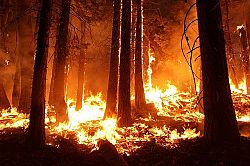

A new study carried out by a team of climate scientists and led by the UK Met Office has set out evidence of the fact that human contributions to greenhouse gases are now beginning to show a real difference in climate.
The study focused on the recent record-breaking heatwave seen in Siberia where temperatures were more than 5 degrees above average between January and June this year. That part of the Arctic circle does naturally experience higher temperatures through parts of the year but the temperatures seen this year have been unprecedented. For instance, Verkhoyansk in Russia, recorded a temperature of 38 degrees in June, which is the highest temperature ever recorded north of the Arctic circle.
Russian President Vladimir Putin had to declare a state of emergency in June because of the heatwave, which has led to natural and human disasters, including vast wild fires which have contributed an estimated 56 megatonnes of carbon dioxide to the atmosphere in June alone. It has also resulted in the widespread melting of permafrost, all contributing to a rather grim environmental scene.
The new research has found that these temperatures are likely to happen naturally less than once in every 80,000 years. It is not therefore a common occurrence and has been described as "almost impossible" by the researchers had the planet not been warmed by greenhouse gases.
The findings are "unequivocal evidence of the impact of climate change on the planet", the scientists claim, which is a statement given in the strongest possible terms and should serve as a warning that things must change, and quickly.
It is not just Siberia that will be affected by uncontrolled human-influenced climate change. The UK is impacted by six weather systems, four of which are driven by conditions in the Arctic according to Dr Katharine Hendry from Bristol University and one of the lead authors on the research.
Dr Hendry has said that extreme weather events in the UK can be linked to the climate changes in the Arctic, including the so-called 'beast from the east' that hit the UK in winter 2018, bringing around £1 billion of damage and which claimed 10 lives. However, the ways in which the warming of the Arctic will impact on the world is unknown. Dr Hendry explained, "Looking at the geological record, we don't think we've had CO2 levels as high for about five million years. So we really don't know what to expect into the future." She added that we're in "uncharted territory."
Aside from global weather conditions, it is also unknown how this will affect biodiversity and ecosystems, or even humans, as the weather conditions in the new climate era we are entering haven't been endured before. Even the smallest impact on local ecosystems can have a profound effect for other life on the planet, including humans.
It is clear we are at a crucial point in our history.